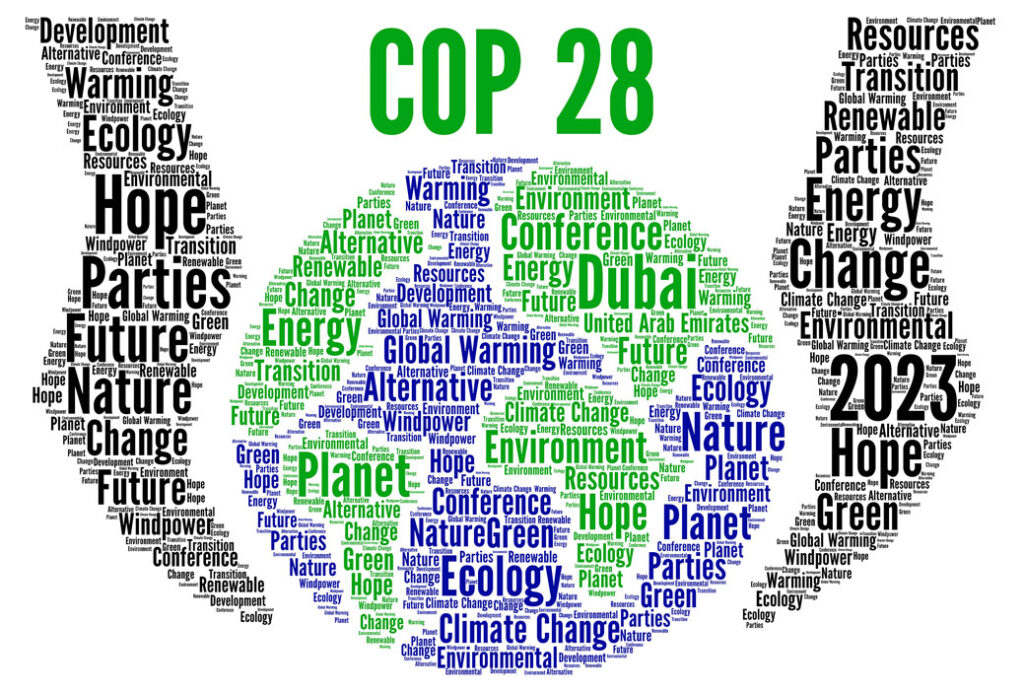As the countdown begins for COP28, set to be held in Dubai between 30th November and 12th December, business energy market leaders and owners are tuned in more than ever. Why? Because the decisions made at these global conferences affect not only the planet’s health but also energy markets, corporate responsibility, and ultimately, the bottom line. Drawing upon insights from last year’s COP27 and an intriguing interview with Adnan Amin, the CEO of the upcoming COP28, let’s dive into what we can expect and why it should matter to the business energy sector.
First, let’s take a moment to reflect on COP27, held in Sharm-el Sheikh. While the conference did yield some significant outcomes in areas like adaptation and global stocktake, it fell short in critical sectors like mitigation, loss and damage, and finance. This shortfall hints at what needs to be prioritised at COP28.

In the UK, the government’s commitment to climate action seems to fluctuate between promise and contradiction. While the government has pledged to reduce carbon emissions by 68% by 2030 and triple funding for climate adaptation, the facts on the ground tell a more complex story. For instance, recent adjustments to the UK’s Emissions Trading Scheme (ETS) have left room for concern. Last year, 53.5 million tonnes of additional carbon allowances were infused into the ETS for 2024-2027, causing the UK carbon price to plummet from £78.78 to £42.14. This move not only makes it cheaper for companies to pollute but also stands to cost the Treasury up to £4 billion a year in auction revenue, thereby weakening the UK’s global stance on climate commitments.
Further complicating the issue are recent policy reversals such as delaying the ban on new diesel and petrol vehicles until 2035 and easing energy efficiency requirements for private landlords. COP27 made it abundantly clear that steps like these are insufficient to reverse the climate crisis, especially given the conference’s failure to yield significant resolutions on reducing fossil fuel usage. These changes not only question the UK’s long-term commitment to climate action but also introduce operational uncertainties for businesses. Prime Minister Rishi Sunak’s decision to not ban new oil and gas development in the North Sea is another red flag.
So, while the UK government appears proactive on paper, the practical implications of its actions, or lack thereof, speak volumes. Whether these moves represent pragmatic policy choices or are rooted in short-term political strategy is up for debate. What is certain is the dilution of the urgency and scale of effort needed to tackle climate change.
When Prime Minister Rishi Sunak attends the summit, which he has pledged to do, he should be prepared for a critical reception — not just from other nations but from anyone committed to genuine climate action. Furthermore, the UK’s policy reversals may provide a convenient excuse for other nations to rollback their own climate commitments, either as a cost-cutting measure or under the pretext of ‘if you’re not doing it, neither will we.’
As we look forward to the United Nations Climate Change Conference (COP28), there’s a critical question we must ask: Are countries genuinely committed to the lofty objectives these meetings promise, or is this merely a well-orchestrated PR exercise?
Let’s consider the complex landscape. Powerful Western states, led by the United States and the EU, have paradoxical relationships with climate initiatives. On the one hand, they have led the charge in global climate discussions, advocating for stringent emission targets and renewable energy adoption. On the other hand, for instance, in 2022, the United States asked oil-rich Middle Eastern countries like Saudi Arabia, Qatar, and the UAE to increase their oil production to mitigate domestic inflation, only to later call on these same countries to reduce their carbon footprint. Such conflicting agendas reveal not just inconsistency but may hint at a broader strategy of using climate discussions as platforms for moral posturing rather than genuine change.
Furthermore, when Sultan Al-Jaber, the Climate Envoy of the UAE and chairman of one of the world’s largest oil companies, was selected as the president-designate for COP28, U.S. Congress members expressed concern. It’s ironic that these concerns came from U.S. Congress members, representing a country that itself is the globe’s largest oil producer and second-largest polluter. Such a stance further blurs the line between genuine intent and performative action.
At Inteb, we believe that this kind of ambiguity dilutes the true objectives of international gatherings aimed at climate action. Countries eager for ‘green’ accolades may, in reality, be overshadowing the fundamental, transformative goals that these meetings were initially designed to achieve.
Western powers have frequently used climate change as a vehicle for broader moral narratives, conveniently bypassing their own shortcomings and histories of resource exploitation. Whether couched as regime criticism or cultural critique, these tactics reveal a tension between public professions and practical actions.
It’s also worth noting that this form of moral posturing is not limited to any single ideology or political leaning. Across the spectrum, from right-wing to progressive to far-left, the use of climate concerns as a tool for foreign policy and public image appears to be growing.
So, as we approach COP28, it’s crucial to question the motives behind the public stances of attending nations. Are we collectively committed to making real change, or is this conference merely another stage set for ‘performative activism’? Without a unified, genuine commitment to change, these international forums risk becoming little more than platforms for empty rhetoric.
We at Inteb believe it’s high time we had a more authentic dialogue about climate action, one that moves beyond public relations tactics and confronts the hard truths we must face as a global community.

Adnan Amin, the CEO and key official for COP28, refers to the upcoming event as a “course correction.” While he acknowledges that a complete phase-out of fossil fuels looks unlikely, he points to the inevitability of a “phase down of fossil fuels.” Given that the COP28 president is an oil executive, the conference sets a unique stage for conflict and compromise, essentially walking on a diplomatic tightrope.
Interestingly, Amin envisions COP28 as the most inclusive ever, even inviting fossil fuel interests to the negotiations. He has outlined four critical performance indicators for the conference’s success, including increased climate financial aid, decarbonisation of energy systems, more funding for nations to adapt, and involving a broader group of stakeholders.

For businesses, particularly those in the energy sector, COP28 offers both challenges and opportunities. While we might not see a dramatic shift away from fossil fuels, we can expect greater scrutiny and tighter regulations that could affect the industry’s market dynamics. On the flip side, as more funding is expected to flow into renewable energy and decarbonisation efforts, businesses that are already investing in these areas could see considerable gains.
Moreover, with discussions around financial aid for developing countries, companies operating globally must consider their footprint beyond borders. Energy market leaders should see COP28 as a precursor to future policy changes that may necessitate a restructuring of energy portfolios, focusing more on renewable resources and cutting down on fossil fuels.
While COP28 sets the global stage, your business can set a smaller, but no less vital, stage. Now is the time to establish your brand as a leader in sustainable energy solutions. Initiatives like Inteb’s expert consultancy services not only help you achieve net-zero targets but also make you attractive partners for future sustainable collaborations. Given that the world is moving slowly but surely towards cleaner energy solutions, early investment and adoption could position you as a thought leader, attracting more clients and partnerships.
Though COP28 might not be the groundbreaking event that climate activists hope for, it will undoubtedly set the tone for international climate policies in the coming years. Energy market leaders have a crucial role to play, both in contributing to a greener future and adapting to inevitable market shifts. The onus is on us to not only watch but to act, because when it comes to climate change, every degree and every decision counts.

In these crucial times, your business doesn’t have to navigate the turbulent waters of climate change alone. At Inteb, we help you set achievable ESG and net-zero targets, giving you practical and FutureNetZero-standard accredited advice. Your business can be part of the solution.
Interested in learning more about how your business can adapt and thrive in this ever-changing landscape? Contact Call Andrew today on 0151 601 3476 or email andrew.snowball@inteb.uk
Stay ahead of the curve and make a tangible difference. COP28 is not just an event; it’s a call to action for all. Will your business answer the call?